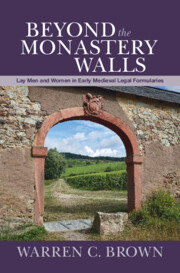Book contents
- Beyond the Monastery Walls
- Beyond the Monastery Walls
- Copyright page
- Dedication
- Contents
- Figures
- Acknowledgments
- Abbreviations
- Part I The Gate
- Part II The Laity
- 4 Laypeople and Documents
- 5 Laypeople and Property
- 6 Family
- 7 Conflict and Justice
- 8 Power, Personal Relationships, and Letters
- 9 Freedom and Unfreedom
- 10 Conclusions
- Bibliography
- Manuscript Index
- Main Index
4 - Laypeople and Documents
from Part II - The Laity
Published online by Cambridge University Press: 09 December 2022
- Beyond the Monastery Walls
- Beyond the Monastery Walls
- Copyright page
- Dedication
- Contents
- Figures
- Acknowledgments
- Abbreviations
- Part I The Gate
- Part II The Laity
- 4 Laypeople and Documents
- 5 Laypeople and Property
- 6 Family
- 7 Conflict and Justice
- 8 Power, Personal Relationships, and Letters
- 9 Freedom and Unfreedom
- 10 Conclusions
- Bibliography
- Manuscript Index
- Main Index
Summary
This chapter works through the evidence that in the world envisioned by the Flavigny formula collection and its companions, lay people used documents and letters like those that the formula collections contain to do things that did not involve churches and monasteries, and explore how the formulas say that they used them. This evidence is considerable, and extends well beyond laypeople simply appearing as actors in transactions that were recorded in writing. It includes transactions assuming in principle that the actors involved would keep the records for future reference: laypeople presenting documents as evidence in disputes; provisions for laypeople to update their documents by erasing parts of them and then writing in new words; documents that refer to other documents; references to lay archives, particular some that had been destroyed and whose contents needed to be replaced. Socially document use ranges from members of the elites, to unfree acquiring documents giving them freedom or presenting documents as proof that they had been free to begin with, to lower-status people showing up in front of someone with higher status with a letter of recommendation, to merchants carrying copies of royal privileges with them.
- Type
- Chapter
- Information
- Beyond the Monastery WallsLay Men and Women in Early Medieval Legal Formularies, pp. 121 - 150Publisher: Cambridge University PressPrint publication year: 2022

